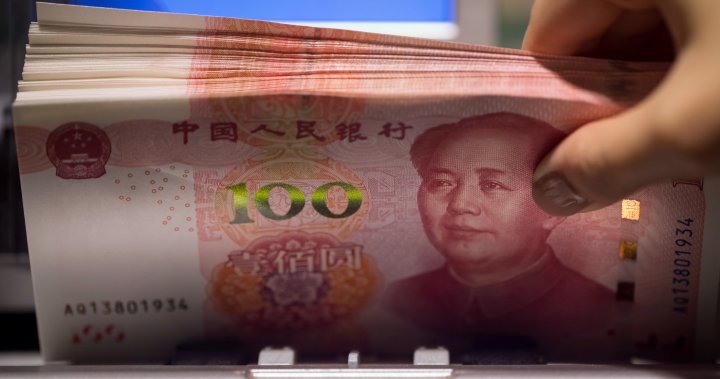Growing signs of weakness in China’s economy could be “good news” for Canada’s inflation fight, but experts warn it could also mean a steeper downturn domestically this fall.
The early stages of China’s rebound from the COVID-19 pandemic spurred hope for a stronger global recovery at the start of this year, but recent months have seen some economic forecasters slash expectations for the world’s second-biggest economy.
Here’s a look at what’s behind China’s faltering economy and the ripple effects it could have in other countries.
What’s behind China’s economic decline?
China stocks fell to around nine-month lows on Monday as investors reacted to milder-than-expected measures by authorities to boost confidence in the economy, with sluggish recovery, high youth unemployment and property woes keeping sentiment fragile.

Economic output and consumer spending came in below expectations in July, coming off one of China’s weakest quarters for annualized growth in decades.
Jimmy Jean, Desjardins’ chief economist, said in a note on Aug. 11 that slowing foreign-direct investment, Western trade restrictions and a trend of multinational corporations reconfiguring their supply chains away from China post-COVID are all compounding to hamper growth.
“We were always skeptical of the narrative that China’s reopening would save the global economy this year,” he wrote. “So far, there isn’t much proving us wrong.”
China cut bank lending rates in an effort to spur activity in the economy, but those moves fell short of some analyst expectations.
The government is trying to reassure uneasy homebuyers and investors about the deeply-indebted real estate industry after one of China’s biggest developers, Country Garden, failed to make a payment to bondholders last week.
China’s real estate vulnerabilities
Like Canada, China’s economy is especially vulnerable to downturns in the real estate market, says BMO senior economist Art Woo.
Real estate, including the housing market, construction and furnishings, makes up about 25 per cent of China’s gross domestic product, Woo tells Global News.
Chinese cities have been experiencing a boom in real estate in recent years with an urbanization push from China’s rural regions.
“It’s this massive demand for people who want to get into housing,” Woo says, comparing the phenomenon to Canadians and newcomers attempting to break into expensive domestic markets such as Toronto.

Housing is also an attractive investment asset in China, where Woo says residents will often purchase second properties as a place to grow their life savings.
“That magnifies the importance of (real estate) in terms of an asset for people to live, but also an asset in which people have invested,” he explains.
But Woo says China’s real estate sector has been particularly unstable in recent years amid the Evergrande Group crisis, which has seen one of the country’s largest housing developers default on its debts. That has soured many investors on the country’s housing market.
Chinese President Xi Jinping has called for patience as the ruling Communist Party tries to reverse the deepening economic slump.
China’s slowdown and the impact on inflation
A slowing Chinese economy is set to affect demand for commodities globally, Woo says.
Amid the urbanization drive and the push to expand critical infrastructure like high-speed rail in China, the country has become responsible for roughly half the world’s demand for base metals in a typical year, he says.
While Canada is an exporter of critical minerals, its direct outbound trade with China is limited, with exports to the country accounting for roughly one per cent of Canadian gross domestic product over the past five years, Woo says.
Commodity prices are set globally, however, meaning changes on one side of the world will affect prices internationally.
“For commodity exporters — and Canada is one — it has a huge impact,” Woo says.
Jean said in his note earlier this month that a slowdown in China is having a chilling effect on prices for exports coming out from the manufacturing juggernaut.

China has ended up an “ally” in Canada’s efforts to rein in inflation, Jean argued, citing the largest drop in import prices since 2017 in Statistics Canada’s latest international trade report.
“China’s woes are ironically helpful in the fight against inflation,” he wrote.
The Bank of Canada is hoping to see inflation pressures ease as it gears up for its next interest rate decision on Sept. 6. Annual inflation ticked up half a percentage point to 3.3 per cent in July, with high gas prices partially to blame.
Slowing growth from the world’s second-biggest economy is sure to have an impact on demand for oil, Woo notes.
“In a way, a slower China takes off pressure, in terms of demand for certain goods,” he says.
“The Bank of Canada is still worried about inflation. Inflation’s still above target. So that could be good news.”
Global oil prices have been climbing over the past two months amid production cuts from OPEC+. While that’s bad news at the gas pump, it’s typically good news for Canadian oil exports.
Jean outlined in his note the offsetting effects of slowing demand in China and Europe alongside cuts from OPEC and signals of acceleration in U.S. shale production. For Canada, these factors are likely to be a wash as it relates to gas prices fuelling inflation, he argued.
— with files from the Associated Press, Reuters




